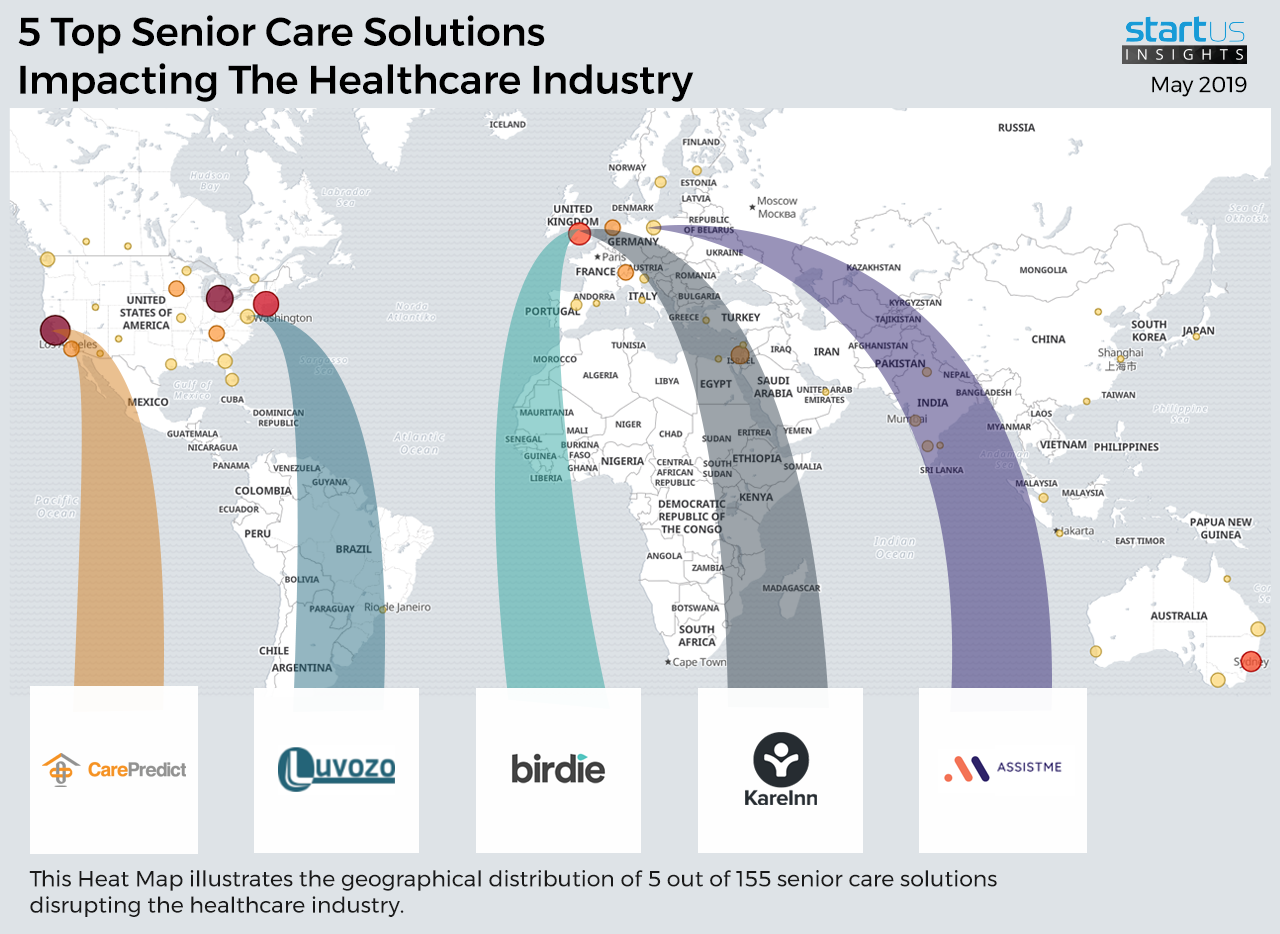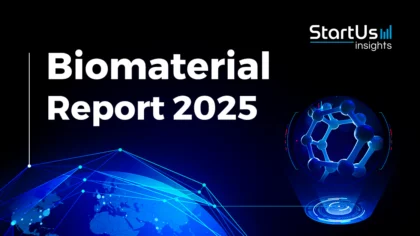Our Innovation Analysts recently looked into emerging technologies and up-and-coming startups in the healthcare industry. As there is a large number of startups working on a wide variety of solutions, we want to share our insights with you. So, let’s take a look at promising senior care solutions.
Heat Map: 5 Top Senior Care Startups
For our 5 picks of senior care startups, we used a data-driven startup scouting approach to identify the most relevant solutions globally. The Global Startup Heat Map below highlights 5 interesting examples out of 155 relevant solutions. Depending on your specific needs, your top picks might look entirely different.
Senior care is gaining increasing importance due to the outbreak of SARS-CoV-2, leading to the Coronavirus pandemic. While it is especially important to protect those over 60 years from getting infected, it is equally important to provide them with the care they need.
Below, we’ll deep-dive into 5 use cases for senior care that will have an impact on the industry, even when the COVID-19 outbreak is over.
Birdie – Remote Monitoring Platforms
Digital apps and connected devices optimize healthcare for the elderly providing a channel for communication and information sharing between care professionals, families and health practitioners. They help monitor health conditions via remote sensors and allow families to follow the elderly’s health and wellbeing 24/7.
London-based Birdie is a care platform that offers tailored preventive care for seniors that live independently in their own homes. Their solution includes apps and connected devices to track well-being. The company also develops health analytics technology leveraging the remote sensors. Its algorithms track health conditions, predict issues at risk of worsening, and alert the people in charge in time.
Luvozo PBC – Robotics
Autonomous mobile robots help check on patients more regularly, reduce the costs of care, raise patient satisfaction index and compensate for the lack of interaction and attention.
Luvozo PBC, a startup from Maryland, USA, develops solutions for improving the quality of life for seniors and persons with disabilities at home and in senior living communities. SAM, their human-sized robot, combines technology and a human touch to provide frequent check-ins, hands-free communications portal, automated fall hazard assessment, and non-medical care for residents in long-term care settings.
KareInn – Data Management System
A smart platform for care planning and recording gives managers valuable insights, such as weight loss, sleep disorder or other triggers, that could be missed with a standard approach. Along with real-time alerting, paperless records and illness history, the system helps reduce preventable risks, resolve escalated issues and coordinate better-personalized care operations.
London-based KareInn offers a Software-as-a-Service (SaaS) platform that digitizes patient records and staff activity, helping care homes achieve greater visibility, better compliance, and improved continuity and safety of care. Care home data delivers proprietary insights that help reduce preventable risks and improve the quality of life for residents.
CarePredict – Predictive Analytics
The goal of predictive analytics is to collect information for analyses of current or historical data and to make informed predictions for the future. For senior living, this means that caregivers are able to predict illnesses before the first symptoms show. The right technologies streamline this process even further, by recording everything from seniors’ activity levels and emotional health to mobility, giving the most complete view of the overall health.
Californian CarePredict develops Tempo, a wrist-worn bracelet with a microphone and speaker, along with sensors that detect activities of daily living (ADL). It uses Artificial Intelligence algorithms to sense ADLs such as eating, bathing, grooming, tooth-brushing, walking, sitting, sleeping, etc. and to communicate wirelessly with beacons in order to pinpoint the rooms, where the activities are occurring. Tempo detects changes that may signal the onset of serious health problems and alerts the home care provider for early intervention before the senior person needs to be hospitalized.
AssistMe – Internet of Things (IoT)
Healthcare smart devices help seniors to care for themselves more easily, independently and comfortably at home by making everyday tasks easier and reducing the need to get up and turn on/off devices. They also monitor medication compliance and – for caregivers – continuously track a patient’s movements, falls and main vital signs (temperature, blood pressure, glucose levels, etc.).
Berlin-based AssistMe builds AidMate, a connected care system for the elderly together with their smart incontinence pants. The system provides a caregiver with the information, enabling timely pants changing, which restores dignity and helps avoid infections. Through the growing amount of data and machine learning, intelligent algorithms detect emergencies, abnormal patterns, and medical problems while predicting issues and harmful behavior.
What About The Other 150 Senior Care Solutions?
While we believe data is key to creating insights it can be easy to be overwhelmed by it. Our ambition is to create a comprehensive overview and provide actionable innovation intelligence for your Proof of Concept (PoC), partnership, or investment targets. The 5 senior care startups showcased above are promising examples out of 155 we analyzed for this article. To identify the most relevant solutions based on your specific criteria and collaboration strategy, get in touch.










